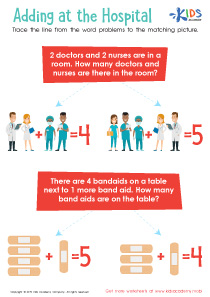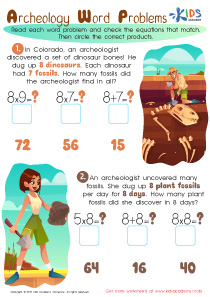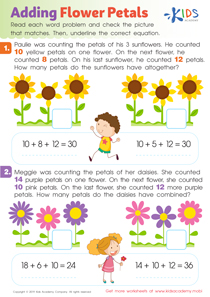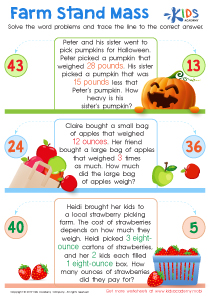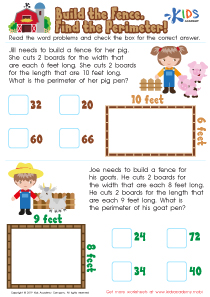Normal Money Word Problems Worksheets for Ages 4-5
1 filtered results
-
From - To
Introduce your little learners to the basics of financial literacy with our Normal Money Word Problems worksheets, designed specifically for children aged 4-5 years. These educational homework sheets offer a delightful blend of fun and learning, helping young minds grasp the essential concepts of money through engaging, age-appropriate problems. Each worksheet is carefully crafted to ensure it meets educational standards while keeping the content accessible and enjoyable for preschoolers. Start building a strong foundation in financial understanding early on with these interactive and stimulating exercises, perfect for both classroom use and home study.
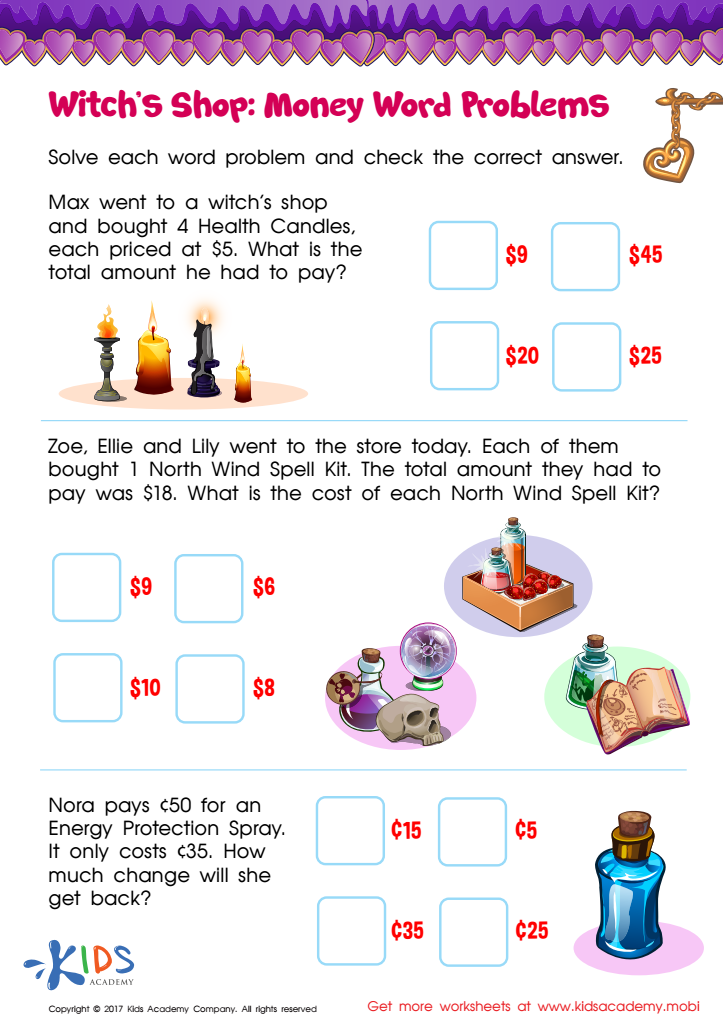

Money Word Problems Printable
The Value of School Worksheets on Money Word Problems for Young Learners (Ages 4-5)
In the early stages of childhood education, introducing young learners to basic financial concepts through school worksheets, specifically those focusing on money word problems, can be incredibly beneficial. For children aged 4 to 5 years, these worksheets are not just tools for learning how to count or identify coins and bills; they are crucial in laying down the foundational skills for mathematical reasoning, problem-solving, and practical life skills.
Foundational Mathematical Skills
School worksheets designed to address money word problems introduce children to the basics of mathematics. These worksheets often include exercises that require counting coins, understanding their values, and simple addition or subtraction of monetary amounts. At the age of 4 to 5, children are developing their number sense—an essential skill that supports their ability to perform more complex math operations in later years. By engaging with money through practical examples, children can connect mathematical concepts to real-world contexts, enhancing both understanding and retention.
Introduction to Financial Literacy
It's never too early to start learning about money management, and school worksheets on money word problems are a great introduction to financial literacy. Children learn to identify different coins and bills, which helps them understand the value of money. These activities also introduce the concept of making choices based on financial limitations, which is a fundamental aspect of financial literacy. For young learners, recognizing that money is a limited resource and learning to make simple spending decisions are invaluable lessons that align with life skills they will need as they grow.
Cognitive Development and Problem Solving
Money word problems require a child to think critically and solve puzzles. These worksheets challenge young learners to apply logical thinking, enhance their problem-solving skills, and develop their reasoning abilities. By interpreting the problems presented and figuring out solutions, children boost their cognitive flexibility and decision-making skills. Such activities also encourage children to remain focused and attentive, improving their overall cognitive development.
Real-World Applications
Integrating real-life scenarios in school worksheets makes learning relatable and engaging for children. When money word problems involve situations like buying toys or choosing between different snacks, children can see the relevance of what they are learning in their everyday lives. This not only makes the learning process enjoyable but also helps children remember and apply what they've learned outside of the classroom.
Language Skills Enhancement
Completing money word problems on worksheets also enhances language skills. These problems often contain a narrative that children need to read and comprehend in order to solve the problem. This reading exercise helps in vocabulary development and improves comprehension skills. As children decode the text and extract necessary information, they practice essential reading skills, which are pivotal at this developmental stage. Additionally, discussing their thoughts and solutions verbally can boost their communication skills, encouraging them to express their reasoning and ideas effectively.
Building Confidence and Independence
As children work through school worksheets on money word problems, they gradually build confidence in their ability to solve problems independently. Early success in these activities fosters a positive attitude towards learning and a belief in their own capabilities. This self-assurance can translate into other academic and personal areas, promoting a lifelong love of learning and self-driven inquiry.
Preparation for Future Academic Success
Engaging with money word problems from an early age sets the stage for more sophisticated mathematical learning and problem-solving in the future. These initial encounters with numbers and logical thinking are stepping stones to more complex mathematical concepts and other STEM (Science, Technology, Engineering, and Mathematics) subjects. Early exposure to structured problem-solving through worksheets prepares children for academic structures they will encounter in higher grades, making transitions smoother and more intuitive.
Parental Engagement and Support
School worksheets on money word problems also provide an excellent opportunity for parents to get involved in their child's early education. Working together on these worksheets allows parents to observe their child's learning style and strengths, offer support where needed, and reinforce the learning happening at school. This shared activity can enhance the child's learning experience and deepen the parent-child bond through constructive and educational interaction.
Conclusion
In conclusion, school worksheets on money word problems are more than just simple educational tools; they are integral components of a holistic educational approach for children aged 4 to 5 years. These worksheets provide a foundation in mathematics, introduce basic financial principles, enhance cognitive and language skills, build confidence, and prepare young learners for future academic endeavors. By integrating real-world scenarios, these worksheets not only make learning relatable and engaging but also ensure that young children develop a practical understanding of money that will serve them throughout their lives. Engaging young minds with these concepts early on lays a solid foundation for their educational journey and beyond.
 Assign to the classroom
Assign to the classroom




